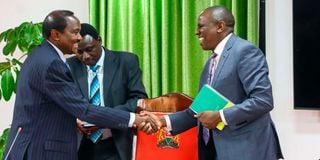Ruto, Raila Bomas talks enter crucial phase

National Dialogue Committee co-chairpersons Kalonzo Musyoka (left) representing the Azimio la Umoja One Kenya Coalition Party and Kimani Ichung’wah for the ruling Kenya Kwanza Alliance during the resumption of the bipartisan talks at the Bomas of Kenya in Nairobi in early August.
What you need to know:
- With a tight deadline, the committee said, it will embark on working overtime to deliver even as it faces the nightmare of contentious issues
- In their submissions last week, the two sides clashed, with Mr Odinga's side demanding that the ruling Kenya Kwanza and opposition nominate commissioners on a 50:50 basis to manage the poll body
- President Ruto wants the IEBC selection panel that he appointed in February to proceed with hiring a team to replace the Wafula Chebukati-led team
The 10-member negotiation team representing President William Ruto and opposition leader Raila Odinga, will from Wednesday begin sifting through a total of 258 submissions by the members of the public.
With a tight deadline, the committee said, it will embark on working overtime to deliver even as it faces the nightmare of contentious issues.
While the committee did not disclose the issues that had not been agreed upon, sources intimated to The Nation that poll audit and reconstitution of the electoral body poised a prickly path.
According to the source, Azimio wants the audit of elections, which involves opening the servers, before the Independent Electoral and Boundaries Commission (IEBC) is reconstituted. This sets the ground for a rocky route ahead as the committee enters phase II and the final phase of their talks.
“We will be able now to begin consensus-building on the five issues starting on Wednesday. And we will be working long hours probably into the weekend until we are able to build consensus on those issues,” said Embu governor Cecily Mbarire who was sitting in for the co-chair Kimani Ichung’wah.
The technical team has been tasked with reviewing the submissions, even as the committee remains open to considering matters brought before them that were outside the five issues that had been agreed upon at the beginning of the talks.
“Even those issues that were brought before us that may not have been part of the five issues, and which we consider to be important, we will also give them time and improve them and give considerations on them,” MP Opiyo Wandayi said, urging Kenyans to remain hopeful that their views will be looked into.
Until the close of phase I of the bipartisan talks, the national dialogue committee disclosed that stakeholder engagement had yielded, with 60 stakeholders represented and 700 persons submitting their memoranda before it.
In their submissions last week, the two sides clashed, with Mr Odinga's side demanding that the ruling Kenya Kwanza and opposition nominate commissioners on a 50:50 basis to manage the poll body.
The opposition is rooting for an Inter-Party Parliamentary Group (IPPG), a system where political parties directly pick commissioners as was the case in 1997.
But President Ruto wants the IEBC selection panel that he appointed in February to proceed with hiring a team to replace the Wafula Chebukati-led team.
This the alliance argued will guarantee the independence of the commission and protect it from possible political interference.
Mr Odinga’s team also cited inconsistencies in the presidential election outcome, insisting that the dispute could only be resolved through a forensic audit.
The coalition proposed that the two camps should engage independent and/or collective forensic audit firms to undertake the process in accordance with the constitution.
But the ruling alliance said opening the presidential election outcome for an audit has a potential to ferment anarchy and chaos. Kenya Kwanza said it would make political players disregard the Supreme Court decision in future.





